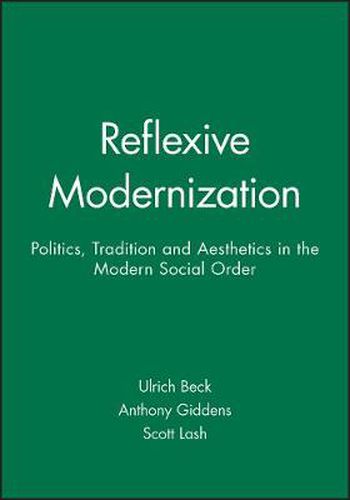Readings Newsletter
Become a Readings Member to make your shopping experience even easier.
Sign in or sign up for free!
You’re not far away from qualifying for FREE standard shipping within Australia
You’ve qualified for FREE standard shipping within Australia
The cart is loading…






The theme of reflexivity has come to be central to social analysis. In this book three prominent social thinkers discuss the implications of reflexive modernization for social and cultural theory today.Ulrich Beck’s vision of the ‘risk society’ has already become extraordinarily influential. He offers a new elaboration of his basic ideas, connecting reflexive modernization with new issues to do with the state and political organization. Giddens offers an in-depth examination of the connections between ‘institutional reflexivity’ and the de-traditionalizing of the modern world. We are entering, he argues, a phase of the development of a global society. A ‘global society’ is not a world society, but one with universalizing tendencies.Lash develops the theme of reflexive modernization in relation to aesthetics and the interpretation of culture. In this domain, he suggests, we need to look again at the conventional theories of postmodernism; ‘aesthetic modernization’ has distinctive qualities that need to be uncovered and analysed. In the concluding sections of the book, the three authors offer critical appraisals of each other’s viewpoints, providing a synthetic conclusion to the work as a whole.
$9.00 standard shipping within Australia
FREE standard shipping within Australia for orders over $100.00
Express & International shipping calculated at checkout
The theme of reflexivity has come to be central to social analysis. In this book three prominent social thinkers discuss the implications of reflexive modernization for social and cultural theory today.Ulrich Beck’s vision of the ‘risk society’ has already become extraordinarily influential. He offers a new elaboration of his basic ideas, connecting reflexive modernization with new issues to do with the state and political organization. Giddens offers an in-depth examination of the connections between ‘institutional reflexivity’ and the de-traditionalizing of the modern world. We are entering, he argues, a phase of the development of a global society. A ‘global society’ is not a world society, but one with universalizing tendencies.Lash develops the theme of reflexive modernization in relation to aesthetics and the interpretation of culture. In this domain, he suggests, we need to look again at the conventional theories of postmodernism; ‘aesthetic modernization’ has distinctive qualities that need to be uncovered and analysed. In the concluding sections of the book, the three authors offer critical appraisals of each other’s viewpoints, providing a synthetic conclusion to the work as a whole.